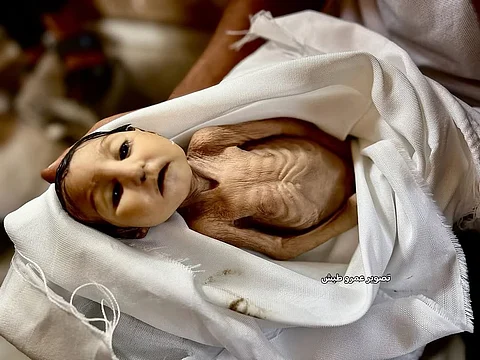

More than half a million Palestinians in Gaza are now trapped in a catastrophic famine, as declared by the United Nations’ Integrated Food Security Phase Classification (IPC) on August 22, 2025.
This dire situation, marked by widespread starvation, acute malnutrition, and preventable deaths, has been directly attributed to Israel’s stringent control over Gaza’s access to food and humanitarian aid.
The crisis, described as entirely man-made, stems from nearly two years of relentless conflict, forced displacement, and severe restrictions on essential supplies, pushing Gaza’s population to the brink of survival.
Israel’s near-total control over Gaza’s borders has crippled the flow of food, water, and medical supplies, exacerbating the famine.
Arbitrary restrictions, such as banning specific goods like coriander on certain days, have compounded the desperation, with aid trucks stranded at borders awaiting Israeli clearance.
The IPC report highlights that only a fraction of needed aid enters Gaza, with 98 percent of cropland damaged or inaccessible, decimating local food production.
This deliberate throttling of resources has led to accusations of war crimes, with UN human rights chief Volker Turk asserting
The famine declared today in Gaza Governorate by the Integrated Food Security Phase Classification (IPC) is the direct result of actions taken by the Israeli government.
The famine’s impact is devastating, particularly on children, with 132,000 under five projected to suffer acute malnutrition by June 2026, including 41,000 severe cases at heightened risk of death.
In July alone, 12,000 children were identified as acutely malnourished — a six-fold increase since January.
One in five babies is born prematurely or underweight, and adults frequently skip meals to prioritize feeding children.
The collapse of Gaza’s health system, coupled with restricted access to safe water and sanitation, has led to surging multi-drug resistant infections and high morbidity rates among children, with diseases like diarrhoea becoming fatal.
The IPC warns that famine conditions, already confirmed in Gaza Governorate, are projected to spread to Deir Al Balah and Khan Younis by September’s end, with North Gaza likely facing even worse conditions.
The UN agencies, including WHO, FAO, UNICEF, and WFP, have issued desperate pleas for an immediate ceasefire to halt the starvation and enable large-scale humanitarian aid delivery.
The IPC’s Famine Review Committee emphasized, “The time for debate and hesitation has passed, starvation is present and is rapidly spreading.”
Without unimpeded access to food, fuel, and medical supplies, avoidable deaths will escalate exponentially.
The ongoing conflict, with over 62,000 deaths and 155,000 injuries reported, alongside the displacement of 1.9 million people—90 percent of Gaza’s population—has left families in overcrowded, unsafe conditions or sleeping in the open.
Israel’s so-called “tactical pause” in July failed to improve conditions, as violence, including airstrikes and shelling, persisted across the Strip.
The UN stresses that restoring commercial flows, market systems, and local food production is critical to reversing the famine, but Israel’s restrictions continue to obstruct these efforts, leaving Gaza’s population in a state of unrelenting despair.